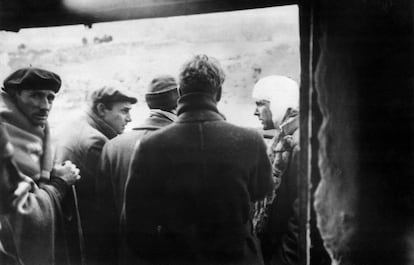The super spy who failed to kill Franco
Spanish writer produces first biographical account of Kim Philby’s role in country’s civil war

In a career that spanned 30 years, Kim Philby, an upper-class Cambridge graduate, turned his back on everything to become a Soviet agent in the 1930s. Starting out on this precarious path, he was sent to Spain, ostensibly to cover the Spanish Civil War for The Times newspaper as a foreign correspondent sympathetic to the Nationalist camp. His real mission: to assassinate Francisco Franco.

The reason why this mission was never accomplished remains a mystery. It has not even been established whether Philby – the so-called Third Man of the treacherous Cambridge Five ring of spies recruited by the Soviet Union – received the assignment. What is known is that Franco survived to rule Spain until his death in 1975, and that Philby went on to became one of the most successful double agents of all time and one of the most damaging moles in this history of British espionage.
Normally double agents last five or 10 years at the most. Philby lasted 30. Enrique Bocanegra, Philby biographer
Seville journalist Enrique Bocanegra spent four years researching Philby’s involvement in Spain, a period that, until now, has been largely ignored in his biographies. Now, Bocanegra’s book, A Spy in the Trenches: Kim Philby in the Spanish Civil War, has been awarded Spain’s Comillas Prize for historical and biographical non-fiction, and has just hit the bookstores.
“We don’t know for certain what happened,” says Bocanegra, who works as a cultural activity coordinator at the Spanish Film Academy in Madrid. “What we do know is that Philby’s Soviet handler in London was told to send someone to Spain to spy on the Nationalist side [which opposed the Spanish Republic], paying special attention to the activities of German and Italian forces; and also to assassinate Franco. Whether Philby was capable of carrying out such an assassination is debatable. He had no military training and didn’t know how to use a gun, not to mention all the security surrounding Franco.”
To this day, nobody is sure whether Philby tried and failed, never dared or, as the author suspects, did not receive the message informing him of this part of his mission.
Due to the lack of documented material on the subject, much of Philby’s time in Spain remains an enigma
In fact, due to the lack of documented material on the subject, much of Philby’s time in Spain remains an enigma. While the author was able to access plenty of archive material in England including the pieces without bylines that Philby wrote for The Times – the only material available to him in Spain was the odd telegram.
The fact that there is so little on Philby in Spain is a mystery in itself because not only was he a renowned journalist from one of the most distinguished newspapers in the world, he also ended up being decorated by Franco. “Were all the files on him destroyed in the 1960s when they discovered he was working for the Soviet Union?” asks Bocanegra.
Philby came to Spain in February, 1937, eight months after the Civil War began, by which time there had already been four different Times correspondents – all of whom had fallen out with the press officers in the Franco camp. As in the life of any spy, a run of good luck allowed Philby to take their place. Contacts provided by his father St John Philby – a diplomat, adventurer and writer – persuaded The Times to take him on.
Philby had no military training and didn’t know how to use a gun
Another lucky break meant that a security check by Franco’s henchmen failed to find the scrap of paper on which he had written his secret codes and yet another made him the only survivor of an attack on the car he and three colleagues were traveling in on the road to the Teruel front.
The fascist propaganda machine capitalized on the deaths of the foreign journalists in Teruel and turned Philby into a hero, his survival earning him his recognition from Franco. Subsequently, he enjoyed slightly more freedom of movement among the Nationalists.
Bocanegra was helped with his research by distinguished British journalists and Philby biographers, Patrick Seale and Phillip Knightley, both of whom died during the writing of the book. They were, says Bocanegra, both very generous with their time, their knowledge and their documents. Seale, who was a friend of Philby’s when both were working in Beirut, was very ill when the author was interviewing him in London. “He told me he had to go to hospital and he left me alone in his house with a case that had Philby’s name on it and which contained numerous documents on him,” says Bocanegra. “So I stayed there all day, photographing papers, just as Philby had so many times in his own life.”
But Bocanegra’s book is not just about Philby during the Spanish Civil War. It is also a portrait of communist espionage in the 1930s when Stalin’s agents, including men such as Alexander Orlov, tried to increase Soviet influence over the Republicans. In the end, they themselves fell victim to the very purges they had helped to set in motion. None of these developments, however – not even the pact between Nazi Germany and the USSR – would shake Philby’s communist loyalties. The chapter in Spain was only the beginning of a double life that would end in Moscow in 1988.
The Third Man
“Normally double agents last five or 10 years at the most,” says Bocanegra in reference to Philby’s extraordinarily long career in espionage. “He lasted 30.”
Not surprising in someone who dealt almost exclusively in lies and deceit, Philby's life remains shrouded in mystery despite the many books written, including A Spy Among Friends by Ben Macintyre.
Born in 1912, he was the so-called Third Man of a group of five idealistic young Cambridge graduates who decided to spy for the USSR.
After years in the business, he came under suspicion in 1951, when he helped two of the Cambridge Five, Guy Burgess and Donald MacLean, to defect to Russia. Despite being subjected to repeated MI6 interrogations, he did not crack and was able to leave the British Secret Service of his own accord. He then went to work in Beirut for The Observer and The Economist, during which time MI6 enlisted his services again. In fact, the true nature of his work only came to light after he defected to the USSR from Beirut in 1963.
Curiously, just after escaping prosecution for treason, he returned to Spain in May 1952, throwing up more questions. “Who was he still in contact with?” asks Bocanegra. “Where did he stay? Which places did he visit? Why would someone in his situation, without work and money and suspected of being a communist, travel to Franco's Spain, the poorest and most backward country in Europe? Was it part of another intelligence operation?” These are questions that still have no answers.
English version by Heather Galloway.
Tu suscripción se está usando en otro dispositivo
¿Quieres añadir otro usuario a tu suscripción?
Si continúas leyendo en este dispositivo, no se podrá leer en el otro.
FlechaTu suscripción se está usando en otro dispositivo y solo puedes acceder a EL PAÍS desde un dispositivo a la vez.
Si quieres compartir tu cuenta, cambia tu suscripción a la modalidad Premium, así podrás añadir otro usuario. Cada uno accederá con su propia cuenta de email, lo que os permitirá personalizar vuestra experiencia en EL PAÍS.
¿Tienes una suscripción de empresa? Accede aquí para contratar más cuentas.
En el caso de no saber quién está usando tu cuenta, te recomendamos cambiar tu contraseña aquí.
Si decides continuar compartiendo tu cuenta, este mensaje se mostrará en tu dispositivo y en el de la otra persona que está usando tu cuenta de forma indefinida, afectando a tu experiencia de lectura. Puedes consultar aquí los términos y condiciones de la suscripción digital.








































